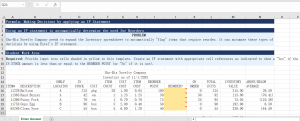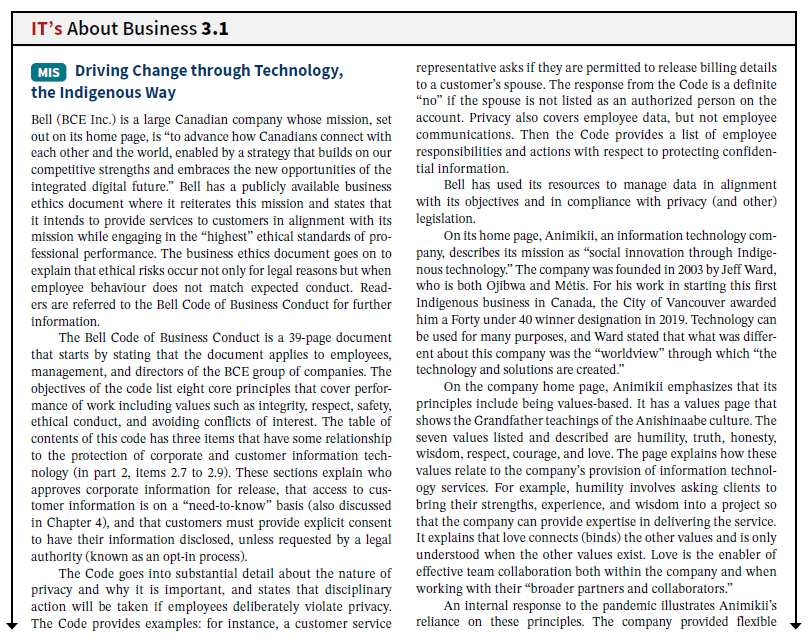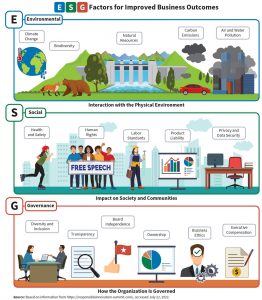
Introduction to Information Systems, 6th Canadian Edition
By Kelly Rainer, Brad Prince, Cristobal Sanchez-Rodriguez, Sepideh Ebrahimi, and Ingrid Splettstoesser
As digital transformation becomes increasingly central to effective corporate strategy, today’s students must learn how information systems provide the foundation for modern business enterprises. Known for its rich Canadian content and focus on active learning, Introduction to Information Systems, 6th Canadian Edition shows students how they can use IS to help their current or future employers increase profitability, improve customer service, manage daily operations, and drive impact in their markets. This course demonstrates that IT is the backbone of any business, whether a student is majoring in accounting, finance, marketing, human resources, production/operations management, or MIS. In short, students will learn how information systems provide the foundation for all modern organizations, whether they are public sector, private sector, for-profit, or not-for-profit.
Schedule a Demo Request Instructor Account
Learn Concepts Efficiently
Adaptive Assignments ignite students’ confidence to persist so they can develop critical skills. By continuously adapting to each students’ needs and providing achievable goals with just-in-time instruction, Adaptive Assignments close knowledge gaps through scaffolded learning. Powered and refined by the Knewton Adaptive Engine, with more than 15 million users, this new assignment type gives instructors the flexibility and control to create targeted adaptive experiences that match their teaching preferences. With actionable analytics to support student and class intervention, Adaptive Assignments makes teaching and learning more efficient than ever.
Lecture Overview Videos are available for each learning objective in the course and feature one of the authors presenting a clear and brief overview of the topic.
Integrate Ethics and Case-Based Learning
Ethics cases with discussion questions feature a variety of topics such as electronic monitoring and intellectual property rights to encourage students to think critically about how these topics are relevant to business and their own lives. Select cases are also available in video format in WileyPLUS to spark classroom debate and discussion.
Develop Data Analytics and Excel Skills
Help students develop foundational data analytics software skills with Data Analysis Technology Bootcamps, available for Excel, Tableau, Power BI, Alteryx, and SQL. Each bootcamp includes Overview Videos, How-To Videos, and Solution Walkthrough Videos to ensure students have the support they need to learn how to use the software and perform specific tasks, as well as assignable application exercises and data sets to help students demonstrate their understanding of the tool in a business context.

Gradable Excel Assignments develop the Excel knowledge and skills students need by giving them the opportunity to practice using formulas and functions to complete specific exercises in a real Microsoft Excel worksheet. With exercises based on questions from the book, automatic grading, and immediate and detailed cell-level feedback, students build key skills needed to be competitive in today’s job market while enhancing their understanding of key course concepts.

Incorporate Important Business Topics
Indigenous perspectives are integrated throughout the course, highlighting the unique characteristics of Indigenous businesses and their use of technology. Topics include how Indigenous financial resources and values are used to improve the lives of First Nations by increasing access to reliable power, effective use of middleware and packaged software, and improving broadband internet access for remote areas and reserves.

Introduce your students to ESG in the business context with the WileyPLUS ESG Module, designed to help students understand what ESG is, why it’s important, and how it’s changing the modern accounting and business world. Students work through each pillar of ESG through lessons on Environment, Social, Governance, and Reporting, along with relatable business scenarios with recognizable companies, access to real-world sample reports, and assignable quiz questions.
Engage Students Through Real-World Videos
Real-World Video Activities are a set of graded analysis activities that pair cutting-edge Bloomberg video content with concepts from the course. Students work through an applied and engaging learning experience to support their understanding of information systems material.
Career Application Videos feature the authors discussing how information systems concepts and skills relate to students’ future careers.
What’s New to the 6th Canadian Edition
- Ethics cases with discussion questions encourage students to think critically about how IS topics are relevant to business and their own lives. Select cases are also available in new videos to spark classroom debate and discussion.
- New WileyPLUS ESG Module exposes students to one of the leading topics changing accounting and business practices in industry. Students work through lessons on each pillar of ESG, which include relatable business scenarios with recognizable companies, access to real-world sample reports, and assignable quiz questions.
- New Data Analysis Technology Bootcamps, available for Excel, Tableau, Power BI, Alteryx, and SQL, teach students how to use the software and perform specific tasks with video-based instruction, assignable application exercises, and data sets.
- New Indigenous perspectives highlight the unique characteristics of Indigenous businesses and their use of technology.
Content Changes
- New Chapter Opening and Closing Cases with discussion questions address business problems faced by real organizations and how they employ information systems and information technology to solve these issues.
- New IT’s About Business Cases feature a variety of examples from large corporations, small businesses, government, and not-for-profit organizations to show the connection between IT and business.
- An emphasis on the digital transformation of organizations to help students understand that information technologies drive such transformations, including Big Data, wireless and mobile computing, and cloud computing.
- New chapter on artificial intelligence so students receive a thorough understanding of AI, its capabilities, and its applications in functional areas of accounting, finance, marketing, production and operations management, human resource management, and MIS.
- Updated Technology Guides to reflect the latest technology updates.

Kelly Rainer is the George Phillips Privett Professor in the Harbert College of Business at Auburn University. He earned his Ph.D. from the University of Georgia (1988). Rainer has published in MIS Quarterly, Journal of Management Information Systems, Communications of the ACM, and Decision Sciences as well as other leading journals. He is associate editor of the Information Resources Management Journal and associate editor of the Communications of the Association of Information Systems Journal.

Brad Prince is a professor of information systems at the University of West Georgia. He earned his Ph.D. from Auburn University (2006) where he was a student of Kelly Rainer’s. Prince has published in Review of Business Research, Review of Social Studies, Law and Psychology, European Journal of Information Systems, and Journal of Academy of Business and Economics, among others. He is a member of the Association of Information Systems and the Association of Computing Machinery.

Cristobal Sanchez-Rodriguez is Associate Professor of Management Information Systems at the School of Administrative Studies, York University. He received his PhD in Management from the University of Murcia, Spain. He has taught a range of MIS classes at the undergraduate level including e-commerce and management of strategic information systems. His current research focuses on digital technologies in SMEs and business analytics by professional accountants.

Sepideh Ebrahimi is Assistant Professor of Emerging Technologies, University of Waterloo. She received her PhD in Information Systems from the DeGroote School of Business, McMaster University. Her research focuses on effective and ethical use of data analytics tools in organizations. Her area of research also encompasses information technology adoption and use, enterprise systems, and knowledge management.

Ingrid Splettstoesser-Hogeterp is an accountant, auditor, and management scientist. Her PhD is in Management Sciences (Strategic Information Systems from the University of Waterloo), and she is an FCPA/FCA (Fellow Chartered Professional Accountant/Fellow Chartered Accountant) and CISA (Certified Information Systems Auditor). She teaches management information systems at York University using a multidisciplinary approach that is informed by three undergraduate degrees in Mathematics, Healing Science, and Psychology. She has also taught auditing, information systems auditing, information systems strategy, risk management and statistics. Her research and publications are based on real-word cases involving the documentation and analysis of systems such as e-commerce and distribution systems, addressing organizational and behavioural issues.
CHAPTER 1 Introduction to Information Systems
CHAPTER 2 Organizational Strategy, Competitive Advantage, and Information Systems
CHAPTER 3 Ethics and Privacy
CHAPTER 4 Information Security and Controls
CHAPTER 5 Data and Knowledge Management
CHAPTER 6 Telecommunications and Networking
CHAPTER 7 E-Business and E-Commerce
CHAPTER 8 Wireless, Mobile Computing, and Mobile Commerce
CHAPTER 9 Social Computing
CHAPTER 10 Information Systems within the Organization
CHAPTER 11 Customer Relationship Management and Supply Chain Management
CHAPTER 12 Business Analytics
CHAPTER 13 Acquiring Information Systems and Applications
CHAPTER 14 Artificial Intelligence
TECHNOLOGY GUIDE 1 Hardware
TECHNOLOGY GUIDE 2 Software
TECHNOLOGY GUIDE 3 Cloud Computing
APPENDIX Apply the Concept Activities

